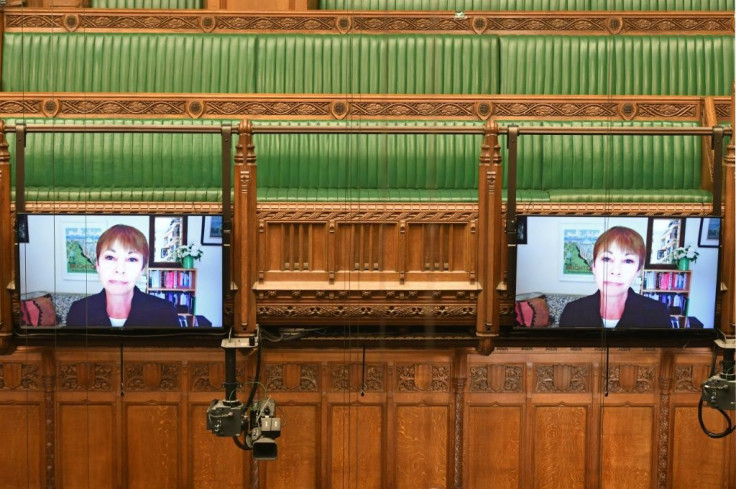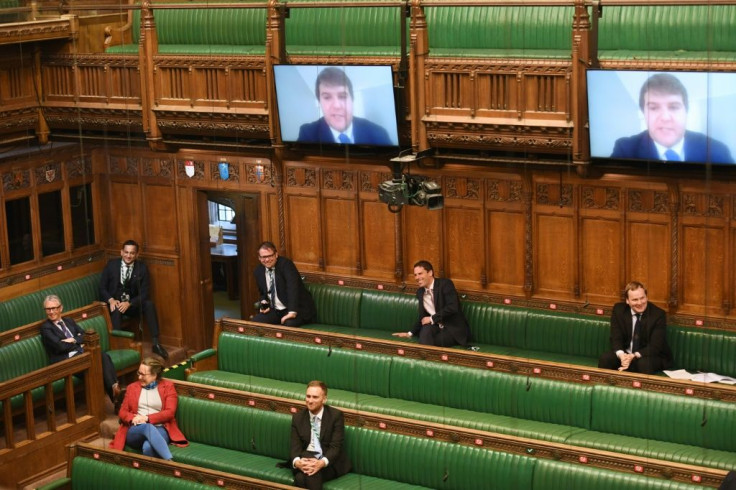UK Parliament Eyes Return To Old Ways After Digital Flirtation
It took a global pandemic to bring Britain's parliament into the 21st century but the government wants to abandon the new virtual debates and voting from June -- and not everybody is happy.
Since the coronavirus lockdown began, members of the 700-year-old lower House of Commons have been able to join debates via videolink, and this week voted online for the first time.
The changes seem to have broadly worked, although it has changed the normal cut and thrust of debate, and the overall atmosphere.
"There are times when the government and opposition all benefit from being able to read the mood of members about a particular topic," said John Angeli, director of parliamentary audio and video.
"I think the thing that's most... dramatically demonstrated over the last few weeks is the absence of the mood of the House over a rather important issue."

A few MPs struggled with the virtual ballot. Finance Minister Rishi Sunak accidentally voted against his own government's agriculture bill, yet it mostly went as planned.
Jacob Rees-Mogg, the minister who deals with the House of Commons, complained that the ability of MPs to hold government to account has been constrained by the new technology.
"Debates are inevitably stilted; they lack interventions," he told the chamber this week.
"I cannot think of any previous occasion when I have spoken for so long without receiving any interventions. I begin to fear that I am boring the house, and I can think of no greater sin."
With the government planning for schools in England to start reopening from June 1, he said that parliament should also be ready to return in purely physical form next month.

"How can we hide away while schoolchildren are going back?" he asked.
The Commons introduced "hybrid" proceedings on April 21, allowing up to 50 of the total of 650 MPs to sit in the chamber at any one time, and another 120 to dial in.
Commons Speaker Lindsay Hoyle said safety would remain the priority, and social distancing must be maintained in the chamber and across parliament until public health advice changes.

Matthew Hamlyn, strategic director of the chamber's business team, said the new way of managing daily business with videolink had turned parliament into a "giant TV studio".
"You maybe have 60 (MPs) all over the country. All of you need to be prepped and checked and then cued in," he added.
There have been teething troubles, including problems with audio, or MPs who fail to make the list for questions. Lack of spontaneity has been a complaint, he said.
But he added: "They've still been appreciative. There's a general view that it's not as good as the real thing but it's much better than not doing it."
The idea of a physical return of all MPs to Westminster in a few weeks time is controversial.
Many MPs believe that Prime Minister Boris Johnson's decision to start easing lockdown measures across England is premature.
The devolved government in Scotland has been particularly critical as Britain's death toll, at more than 33,000 the highest in Europe, is still rising by hundreds each day.
Valerie Vaz, from the main opposition Labour party, said she was "alarmed" at the parliament plans and suggested they contradicted the government's current advice to work from home if you can.
"We want to be here in parliament, but we want to make sure that everyone is safe," she said.
Robert Halfon, an MP in Johnson's Conservative party, urged the government to keep virtual measures in place for those, like him, who were disabled and must continue to self-isolate.
"It is not a parliament for survival of the fittest, it's a parliament for everybody," he told The House political magazine.
Others suggest that parliament should use the opportunity to bring in long-term reform, particularly online voting for those unable to attend due to illness or parental leave.
Tommy Sheppard, an MP with the Scottish National Party (SNP), questioned why anyone would want to queue up to have their vote manually counted by a clerk when the online system had been shown to work.
Advocates of the old way "think they are defending the right to vote, but in fact they are making a fetish out of a 19th century tradition rather than a democratic principle", he said.
© Copyright AFP 2024. All rights reserved.





















